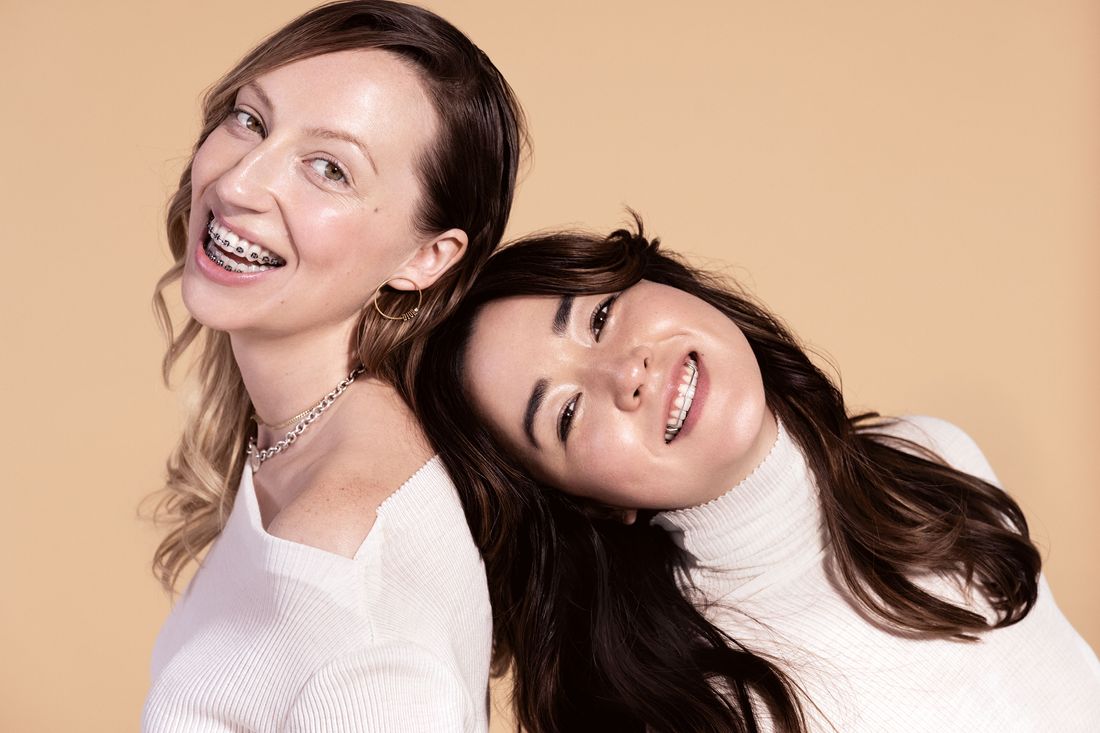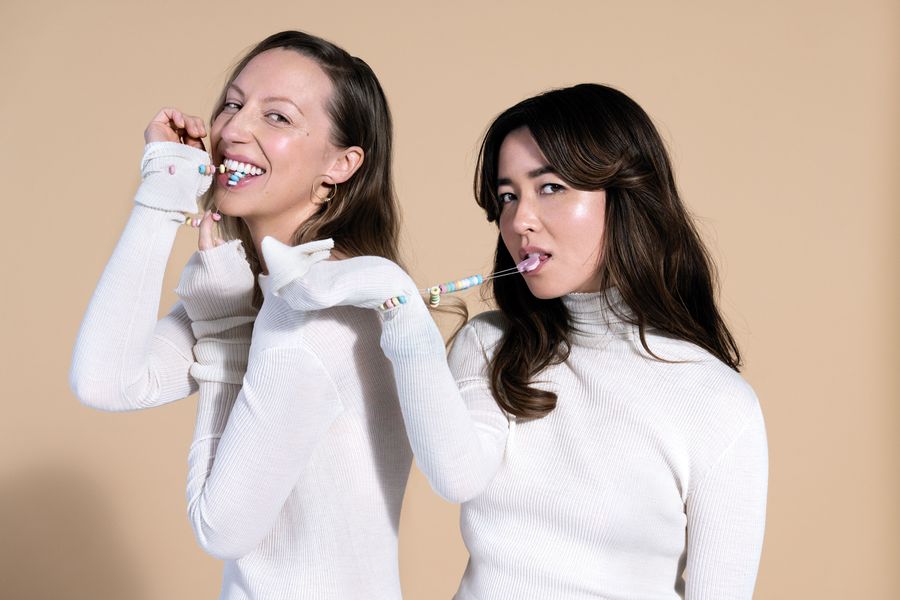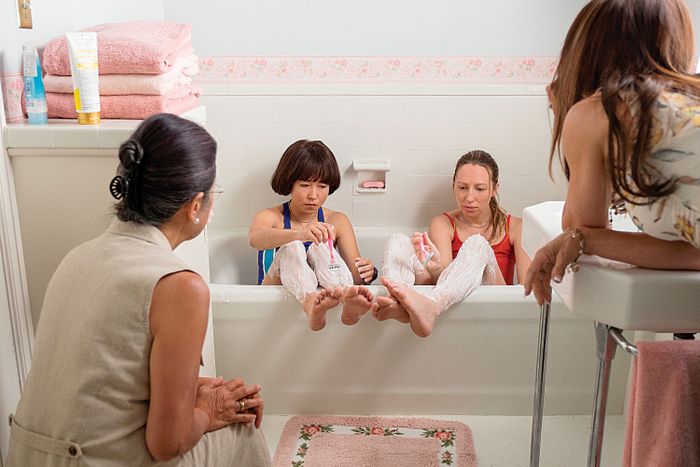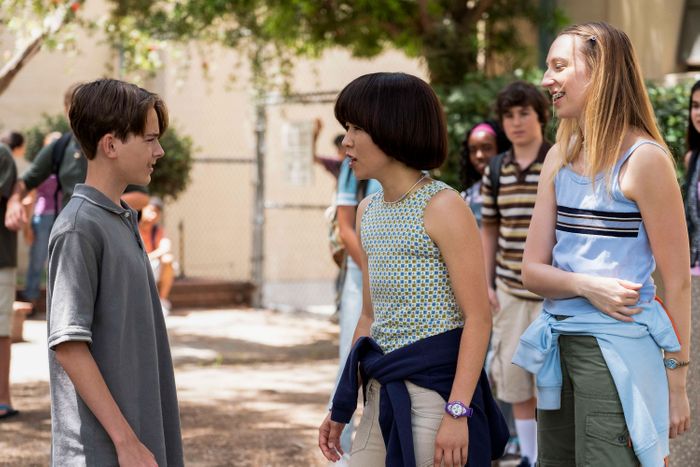
Anna Konkle and Maya Erskine have been in the Claire’s accessories store at the Galleria mall in Glendale, California, for approximately five minutes, and they already sound like teenagers.
“Are you going to get your ears pierced?” Konkle, 31, asks Erskine, also 31.
“You should get your ears pierced.”
“Maybe I will.”
Of course, they’ve had plenty of practice. As the stars and creators of PEN15, a weird and wonderful new show on Hulu, they play Anna Kone and Maya Ishii-Peters, characters based on their seventh-grade selves. Set in the year 2000, the ten-episode series, named after a common schoolyard prank, begins with the two best friends preparing for their first day of middle school: “Seventh grade is gonna be amazing,” the pair gummily enthuse over their see-through landline phones. The joke, as anyone who went to middle school knows, is that it won’t be.
Onscreen Konkle, who is tall and blonde, wears braces and self-consciously hunches her shoulders. Erskine tapes down her chest and sports a bowl haircut, a result of her character’s attempt to cut “layers” the night before the first day of school. Chief among their physical issues, however, is that they are 30-somethings playing tweens and, as such, look ridiculous standing next to their cast, made up of real-life seventh-graders. It’s the first indication they’re not going to fit in very well in middle school, which is the point. “No one really feels like they fit in,” says Erskine, who like her co-star is real-life attractive, with shiny hair and straight Hollywood teeth. She flicks a manicured hand through a rack at Claire’s, the omnipresent accessories chain whose glittering baubles have caused many an adolescent to dash themselves on the rocks of reinvention. “There are so many highs and lows, your body is betraying you, you’re growing these boobs and getting pubic hair and having insane hormones. You’re a mini-adult but also a complete kid. It feels almost operatic.”
At the center of every opera is a great romance, and PEN15’s is between its two leads. “You are my rainbow gel pen in a sea of blue and black writing utensils,” Anna tells Maya at the end of the first episode.
The show is a reflection of “our actual best-friendship,” Konkle says. “Ooooh.” She pulls up short in front of a rack of magnetic earrings. “I kind of want one right here,” she tells Erskine, tapping the side of her nose. “I keep thinking of like a really thin gold nose ring.”
She slips a hoop into her nostril.
“It’s so cute!” Erskine squeals.
“I feel like it doesn’t work on me,” worries Konkle, peering into the mirror. “It highlights my nose’s red spots.”
“I think it looks really natural on you,” says her friend warmly.
Their friendship is not just about encouraging each other to experiment with new accessories; it’s about two outsiders who struggled to make it in an industry that is notoriously even more shallow and cruel than middle school. And how, by sticking together and staying true to themselves, they were able to forge a unique and exciting sensibility, one that eventually attracted the attention of the popular boys. Specifically, the ones from the Lonely Island, who signed on to produce PEN15. And now, Erskine and Konkle, a pair of drama school graduates whose names sound more like a law firm in Queens than ascendant comedy stars, are on the verge of becoming popular.
“But is it weird,” Konkle asks me, “that people are going to think our show is called Penis?”
Erskine and Konkle didn’t meet in seventh grade. They met their junior year of college, in a study-abroad workshop in Amsterdam for NYU’s Tisch School of the Arts, where they were both pursuing degrees in experimental theater.
“We had mutual friends,” Erskine says at an Italian restaurant near the Galleria.
“We had diarrhea,” says Konkle.
“It’s true,” Erskine admits. “We had diarrhea.”
The cause was German playwright Bertolt Brecht. Specifically, the short-notice assignment they’d been given to come up with a performance in his style. Both women suffered from anxiety, and on the morning of, “we were hiding in the bathroom, freaking out,” says Erskine.
They discovered other things in common: a love of dark humor and a desire to remain in New York after graduation and pursue a career in theater.
That didn’t happen. “We would send out our headshots, but people don’t even want to see you if you haven’t gone to grad school,” says Erskine. So Konkle started waiting tables full-time at restaurants like Craftbar and Prune, and Erskine moved back to her native Los Angeles, where she’d gotten a part in an all–Asian American production of Crimes of the Heart. It landed her an agent, who started sending her out on auditions. Still, “it was awful. They were all like, ‘Chinese Waitress No. 2,’” says Erskine, who is half-Japanese. A one-line role in the Rachel Bilson medical drama Hart of Dixie seemed like a break, but arriving at the soundstage, she felt out of her element. “Those shows are just like a huge machine,” she says. “They don’t care about your process. I was like ‘Wait, are we rehearsing?’” When Erskine panics, she gets carpopedal spasms, meaning “my hands turn into claws.” Although this condition makes a hilarious appearance in PEN15, it was not one Dr. Hart was prepared to deal with. She was cut from the episode.
Meanwhile, Konkle was breaking up with her boyfriend and reevaluating her commitment to New York. “My mantra had been, ‘As long as I’m making art I will be happy, even if I have to sleep on a mattress on the floor,’ ” she says. But she was waitressing 50 hours a week, and her most notable role had been in an obscure production in which she “held a leash with five guys at the end of it, barking,” she says. “After seven years, I was like, ‘I was wrong.’”
She drove out to Los Angeles, where she and Erskine planned to make a web series. “It was our last-ditch effort to put our work out,“ Erskine says. “Though I guess it was our first-ditch effort.”
The series, which they called Project Reality, turned out to be a perfect showcase for their comedic sensibility. Each episode took the form of a fake reality-show pilot, which allowed them to inhabit a variety of absurd characters, from the hapless sons of a squirrel-hunting family to Cockney rap duo Big Box and Purple Lips. Erskine and Konkle committed to them with the intensity of, well, graduates of a high-pressure drama school. “We realized how much we loved writing,” says Erskine. The series helped Konkle land a manager at Odenkirk Provissiero (Erskine was already repped by Mosaic), who encouraged them to think about creating something bigger.
“And then one night,” says Erskine, “we went to this party where there were all these kids from my middle school.”
Erskine didn’t just go to any middle school: She went to Crossroads, the hippie-glitzy Santa Monica academy that counts Hollywood royals Gwyneth Paltrow and Kate Hudson as alumni. Erskine’s father is a renowned jazz drummer who has played with Joni Mitchell and Steely Dan. Still, at a school where her brother once witnessed a schoolyard fight over box-office numbers (“Instead of saying, ‘My dad can beat up your dad,’ they were saying, ‘Your dad only grossed three mill’”), she always felt a few Prada bags short of social acceptance. Eventually, she’d transferred to a performing-arts high school in East L.A. But when she looked around the party, “it was all those kids,” she says.
“And they still hung out,” Konkle interjects incredulously. Growing up in suburban Scituate, Massachusetts, she’d had a different junior-high experience. “I wore earrings like this to prom,” she says at Claire’s, tapping a rack of rhinestone earrings, which rattle nonthreateningly against their plastic holders. “Girls in L.A. would not have done that.”
“No they would have worn like, real diamonds,” says Erskine, glumly. “From Tiffany’s. Can you imagine?”
Konkle could. Cool-kid pheromones are universal. Back at the party, “we both reverted to our middle-school selves,” recalls Erskine. “Not cool enough, wearing the wrong things. We turned to each other and were like, ‘Wow, how am I still dealing with the same insecurities I had when I was 13?’ ”
It got them thinking. “As soon as you start talking about being 13 with anyone, the floodgate opens,” Konkle says at the restaurant.
“It’s such a crazy time,” says Erskine. “Your first period. Your first kiss.”
“My first kiss was mortifying,” says Konkle. “My expectations were Saved by the Bell. They were romantic. When it happened, it felt like an alien drilling my throat. I went home and burst out crying.”
“I burst out crying too because it just went like that,” says Erskine, darting her tongue in and out like a lizard. “And I was in ninth grade. I had no action in middle school, but I was masturbating like crazy. You didn’t masturbate in middle school,” she says to Konkle.
Konkle shakes her head. “I was a super-late bloomer.”
Neither of them had seen these kinds of experiences onscreen. “We’re raised to think of guys jerking off as funny fodder,” says Konkle. But there’s no female analogue for the titular scene in American Pie. This may be a greater loss for humanity than you’d think.
“As a young girl, you don’t see that it’s okay,” Erskine says. “I mean, to this day I have to do it under the covers,” she adds, meaning masturbate. “It’s ingrained in me. When I’m exposed, I feel a sense of shame.”
“I didn’t know that,” Konkle says sympathetically.
The show, as they saw it, would include as many of those moments as possible. “All of the secrets,” Konkle says. “The things you pretend aren’t happening.”
At the same time, they strained to come up with a concept that would allow them, then in their late 20s, to play themselves. Maybe they were cult members who had taken refuge in a middle school? Oddly large foster children? “I just had this vision of Maya swaddled on a doorstep,” says Konkle.
“She always wants me to be a baby,” adds Erskine, who appears as such in one of Big Box and Purple Lips rap videos.
Sensing they might need professional help, they brought in their friend Sam Zvibleman, a writer-director with experience writing for television. “I was about three feet tall in middle school, I was called a midget,” he says. “But I feel like my life as a boy was simpler. The girls’ experience was so much more complex and interesting. It really is emotional life and death.”
Zvibleman, the show’s third creator, takes a backseat to the female stars, but it was he who suggested they simply play it straight. “Sam was like, ‘What if there’s no explanation? What if you’re just 13?’ ” says Konkle. “And it was like, Oh, yeah.” Odenkirk Provissiero pitched the concept to Party Over Here, the production company attached to the Lonely Island, which commissioned a 15-minute presentation for them to shop around. The one they came up with “had a scene where a kid fingers my character,” says Erskine. The kid wasn’t actually in the shot — PEN15 is about childhood traumas; it doesn’t want to cause them. They’d come up with what they thought was a funny way of filming around it. “You see Maya and him standing far away from each other, then a close-up of her face,” Konkle explains. “And then we cut to a Bundt cake and a banana.”
Still, networks balked. Three more years passed, during which Erskine and Konkle joined the casts of medical dramas. Then, in 2018, right as films like Lady Bird and Eighth Grade were gaining critical acclaim for tackling adolescence, Hulu picked up the series for a ten-episode run. Minus the fingering scene. “That was the line,” says Erskine, though a masturbation story line did make the cut, as did a version of Konkle’s first kiss. Konkle is careful to point out that she does not actually kiss the 13-year-old actor playing her boyfriend, although this is obvious from the way the scene is filmed in close-up, and the visible stubble lining the onscreen lips (which belong to her real-life boyfriend). Still, the long look that she and the actor exchange before the camera cuts away was unsettling to film. “But I desperately wanted to show how it really felt,” she says, “because I have talked to so many women who have felt that way.”
The creators of PEN15 frequently praise director Todd Solondz for his realistic portrayal of adolescents’ sexual situations, and cite his movies, Welcome to the Dollhouse and Happiness, as influences. But whereas the discomfort Solondz inflicts on his audience feels sadistic, PEN15’s intention feels different. Its creators want you to feel something, but they don’t want you to feel bad. Even the central conceit has a kind of empathy behind it. “If you saw an actual 13-year-old going through some of these traumatic experiences, it might not be as fun to watch,” Erskine explains, “because you’re like, That poor kid. Whereas if you have us as adults playing it, they can be like, Oh, that’s uncomfortable, but you are not actually experiencing this. Or you did, but you got through it.”
This is true of “Posh,” an episode in which Maya and Anna are thrown together with the popular girls on a school project that involves filming a video as the Spice Girls. Clearly this is doomed, but it’s only when the girls press Maya, the only nonwhite one in the group, to take the part of Scary Spice that you begin to see where it’s going. Soon they’re calling Maya their “servant” and having her fetch things. “Because you’re different from us, you’re, like, tan,” one says, asking her to perform with an accent as “Guido the Mexican gardener.”
“That’s racist,” Maya’s brother bluntly informs her later, when she tries to pass it off as a funny thing that happened. Her mother — played by Erskine’s real-life mother — looks as horrified as she might have in real life, back in Erskine’s Crossroads days, when she was the “jester” in a group of popular girls. “That was sort of my way of fitting in,” she says. “I would come up with these characters, and they would pull my pants down and die laughing. They weren’t mean, and it’s not that they are outright being racist, but there were things that would be said like, ‘Oh you’re dirty, you can’t come on the bed with us Maya.’ Like as a ‘joke.’ Those things hit hard, even though you don’t realize at the time.” Even now, it feels complicated, because she had been a participant. “Looking back, I was like, Oh, that was …”
For Erskine, the experience of performing such personal material “opened up a well of emotion I was not prepared for,” she says. “I started bawling.”
The teenage actors whose job it had been to tease her were horrified. The creators explained that they hadn’t done anything wrong, that their acting had been so good it elicited a real emotional reaction.
“Then Anna started crying,” says Erskine. “We just all started crying. It was really weird. It was traumatic for everyone.”
“It’s hard navigating these things sometimes because we’re both really sensitive,” Konkle explains. “We’re not in therapy together, but I think we’ve done a really good job separately. I have literally said to Maya, ‘I wish my boyfriend would do the work that you do!’”
At the moment, the real Anna and Maya are taking a breather from Anna and Maya. “We just needed a little mental break,” says Erskine, who is currently filming a movie with Seth Rogen, one of several projects they are working on while they wait to see if PEN15 will get a second season. If it does, they have a lot of ideas. “We don’t talk about fingering enough,” Erskine points out, for one. And since they started working on the series, people have been telling them the best middle-school stories. Like their one friend, who recalled a ritual he’d come up with to get his girlfriend to break up with him so he could go out with someone more popular. “He jerked off on her photo,” Konkle begins.
“No, he lit the photo of the girl he was going out with on fire,” says Erskine. “Then he put the fire out with his cum.”
“In his mind, it was a ceremony to get her to break up with him,” says Konkle.
“It’s that thing where you are dealing with an adult body, but your logic is still like a child,” Erskine laughs.
The kicker is, it worked: The very next day, the girl broke up him.
“And then,” says Konkle. “She died.”
There’s a brief moment where we all consider the tragicomic possibilities of seventh grade. “There’s so much more to say,” says Erskine. Which is why PEN15’s creators are adamant that no matter how many seasons there are in the future, its main characters will remain seventh-graders in perpetuity. “They could go to different groups, go through new phases, and experience more mature things,” says Erskine, “but the idea is you never get to leave this place.” In the end, does anyone?
As we exit Claire’s, shiny bags dangling at our sides, Konkle touches her nose ring self-consciously. “You guys,” she says. “I’m going to be so embarrassed if I run into anyone I know.”
PEN15 comes to Hulu February 8. Watch the trailer below.
*A version of this article appears in the January 7, 2019, issue of New York Magazine. Subscribe Now!




